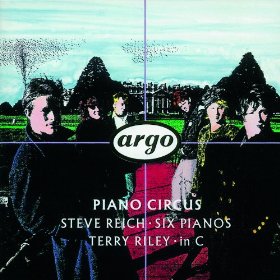Piano Circus
View record and artist detailsRecord and Artist Details
Composer or Director: Steve Reich, Terry Riley
Label: Argo
Magazine Review Date: 6/1991
Media Format: CD or Download
Media Runtime: 42
Mastering:
DDD
Catalogue Number: 430 380-2ZH

Tracks:
| Composition | Artist Credit |
|---|---|
| Six Pianos |
Steve Reich, Composer
Piano Circus Steve Reich, Composer |
| In C |
Terry Riley, Composer
Piano Circus Terry Riley, Composer |
Author:
Here at last is a decent new recording of Steve Reich's elusive Six Pianos. Rarely does the piece reach the concert platform, presumably because promoters blanch at the prospect of assembling six pianos on one stage. My only encounter with a live performance—in a piano shop—further bolstered the impression that the piece doesn't transfer well to record. How can six more or less identical pianos, all busily pounding together and compressed within a recording's narrow stereo spread, possibly communicate the intricacy of the counterpoint or suggest the garrulous dialogue that passes between the instruments? Steve Reich's own performance with his Musicians, recently reissued by DG on CD, suffers from an unrealistic piano sonority and limited depth of space. With their brighter-toned instruments and more immediate recorded sound, Piano Circus come closer to capturing the essence of the work, but even here the six instruments are not easily distinguishable from one another. The playing is brisk and unanimous—the ultimate compliment, since the score leaves virtually no room for individual interpretation.
Less satisfactory, although it, too, has many virtues, is the performance of Terry Riley's In C. To be fair, this classic of minimalism is notated in such a way that anything goes, including the evidently well-planned strategy adopted by Piano Circus (who perform it on two pianos, two harpsichords, Rhodes piano and vibraphone; the scoring is not specified). Everyone plays from a single melodic line divided into dozens of short cells, each of which is repeated ad libitum by each instrument. Movement from one cell to the next is uncoordinated, and as the players move through the score at their own pace, a dense, haphazard polyphony (largely in C major) results.
Devotees of In C will most likely know it from the lively if somewhat ill-disciplined LP recording made by members of the Center of the Creative and Performing Arts, SUNY (Buffalo) under Riley's own direction for CBS (long deleted). This has the air of an easygoing improvisation, unfolding at leisurely pace during the course of 40 minutes. Piano Circus devour the score in half that time, munching their way through the cells in rapid and closely synchronized succession. Rarely do they allow more than three adjacent cells to sound simultaneously. Instead the sense of pressing onward lends the music a predictability that Riley's less regimented version manages to avoid. As in Six Pianos, the standard of playing achieved by Piano Circus is superb.
My greatest reservation about this record concerns its ungenerous playing time. With In C consumed in only 20 minutes and Six Pianos taking 21, there was surely space here for another piece. Are Piano Circus saving up that other classic for multiple keyboards, Steve Reich's Four Organs, for a future record? It would have been most welcome here.'
Less satisfactory, although it, too, has many virtues, is the performance of Terry Riley's In C. To be fair, this classic of minimalism is notated in such a way that anything goes, including the evidently well-planned strategy adopted by Piano Circus (who perform it on two pianos, two harpsichords, Rhodes piano and vibraphone; the scoring is not specified). Everyone plays from a single melodic line divided into dozens of short cells, each of which is repeated ad libitum by each instrument. Movement from one cell to the next is uncoordinated, and as the players move through the score at their own pace, a dense, haphazard polyphony (largely in C major) results.
Devotees of In C will most likely know it from the lively if somewhat ill-disciplined LP recording made by members of the Center of the Creative and Performing Arts, SUNY (Buffalo) under Riley's own direction for CBS (long deleted). This has the air of an easygoing improvisation, unfolding at leisurely pace during the course of 40 minutes. Piano Circus devour the score in half that time, munching their way through the cells in rapid and closely synchronized succession. Rarely do they allow more than three adjacent cells to sound simultaneously. Instead the sense of pressing onward lends the music a predictability that Riley's less regimented version manages to avoid. As in Six Pianos, the standard of playing achieved by Piano Circus is superb.
My greatest reservation about this record concerns its ungenerous playing time. With In C consumed in only 20 minutes and Six Pianos taking 21, there was surely space here for another piece. Are Piano Circus saving up that other classic for multiple keyboards, Steve Reich's Four Organs, for a future record? It would have been most welcome here.'
Discover the world's largest classical music catalogue with Presto Music.

Gramophone Digital Club
- Digital Edition
- Digital Archive
- Reviews Database
- Full website access
From £8.75 / month
Subscribe
Gramophone Full Club
- Print Edition
- Digital Edition
- Digital Archive
- Reviews Database
- Full website access
From £11.00 / month
Subscribe
If you are a library, university or other organisation that would be interested in an institutional subscription to Gramophone please click here for further information.




